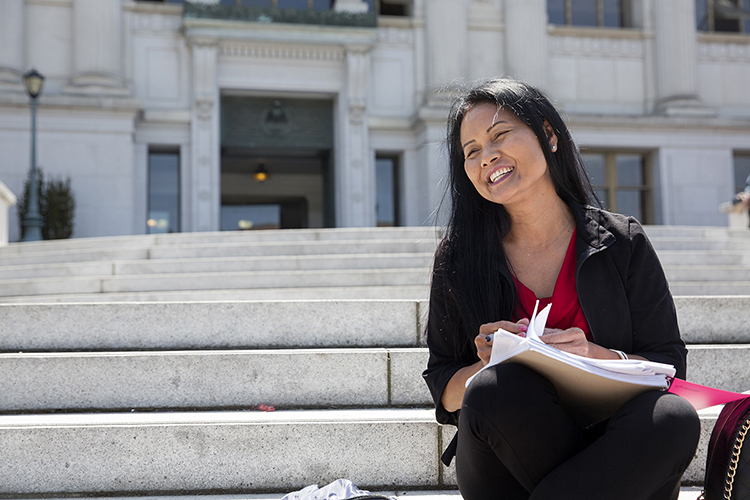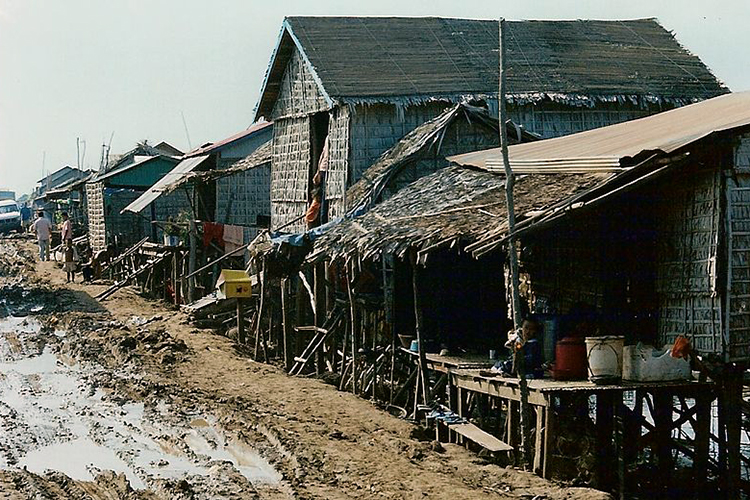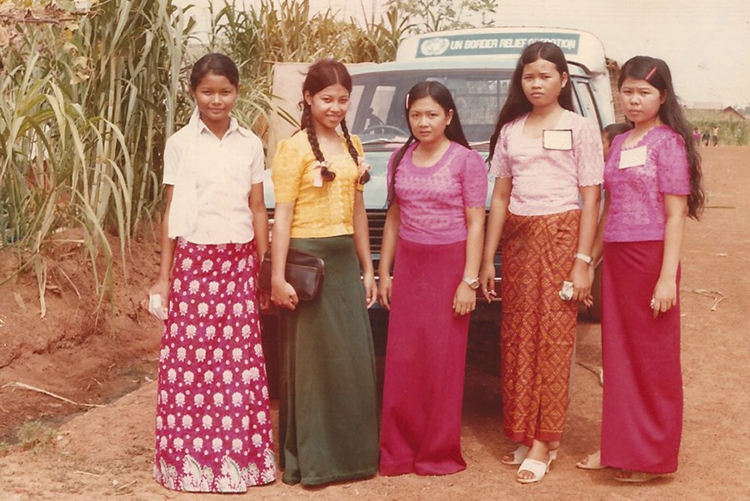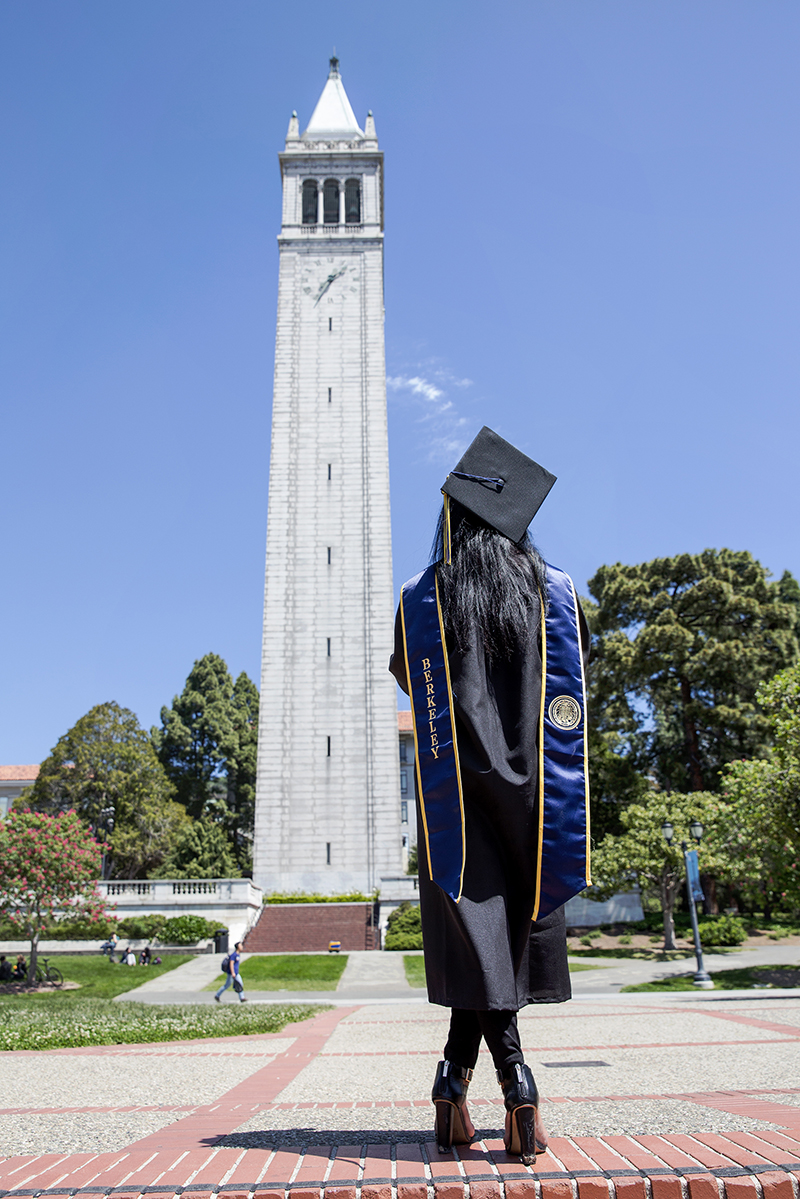From Cambodia’s killing fields to commencement at UC Berkeley
Chansitha Ouk, who was born in Cambodia during the civil war and nearly died in a child labor camp after the Khmer Rouge came to power, will graduate Saturday, May 12, with a bachelor's degree in media studies

May 4, 2018
As a girl, Chansitha Ouk didn’t go to school.
“There was no school,” she says. “I didn’t know what it was. It just didn’t exist. Life was on the run.”
Ouk was born in Cambodia in 1968. The civil war between the Cambodian government and the communist Khmer Rouge had begun the year before. As early as she can remember, she and her family — her two younger sisters, mother and grandmother — were on the move.
“We would move at night from shelter to shelter,” she says. “I grew up always hearing guns shooting and bombings. We just didn’t have anywhere to go. It’s how all families were — alert, always moving.”
It wasn’t until Ouk was 12, living in a refugee camp in Thailand, that she realized what she had been missing. She finally had the chance to go to school — to learn to read and write in her native language, Khmer. She even learned some basic English phrases and became an interpreter for the U.N.
“It was like a new world,” she says. “It was like the light went on. I was so hungry to learn.”
On Saturday, May 12, Ouk is joining more than 5,000 graduating seniors at UC Berkeley as they make their joyous walk across the California Memorial Stadium stage — a feat she never dreamed possible. She will receive a bachelor’s degree in media studies.
It’s her time at Berkeley, she says, that has given her the courage to share her story — one that she hopes will inspire people to push past any obstacle, no matter how big, to follow their dreams and pursue an education.
“My education at Berkeley healed my wounds and filled a deep emptiness,” she says.
Life on the run
During the war, as the oldest of three daughters, Chansitha was responsible for finding food for the family. Every day, the 5-year-old would venture out, with her 4-year-old sister as her lookout, to search farms and rice fields for anything they could eat — rice, vegetables, fish. It was never enough, but it kept them alive.
Chansitha’s father, before he got sick and died when she was a toddler, would call her his boy — she was the daring one, the risk-taker. As she got older, she would negotiate on behalf of her family, never taking ‘no’ for an answer.
“Boys were dominant — they always got their way,” says Ouk. “But we just had to do things to get by, to survive. We never said, ‘Oh, you’re a boy, I’m a girl, we have different roles.’”

Huts in a Cambodian village, similar to what Ouk lived in as a child (Photo by Milei Vencel via Wikimedia)
Each night, the family would pack up their things and move to the next shelter, just bamboo and hay under a mango tree in the Cambodian jungle. Ouk doesn’t remember a time when she didn’t feel terrified. Hundreds of thousands were killed during the war, most of them civilians.
After the war ended in 1975 and the Khmer Rouge came to power, things got worse. Although her family — poor and uneducated — wasn’t specifically targeted by the Khmer Rouge, she says, they experienced misery and suffering like most Cambodians.
One day, the family, along with hundreds of others, was forced to walk for days to a labor camp in Kanghot. Anyone too weak to keep walking was left to die on the side of the road.
At the camp, everyone was required to attend public executions; anyone who the Khmer Rouge deemed an offender was beheaded and the severed heads were tied together by their hair and stacked to form an archway over the entrance as a warning.
After a few days, Chansitha, now 7, was separated from her family and sent to a child labor camp. This time she couldn’t negotiate. “You couldn’t cry,” she says. “They didn’t give us a chance to say goodbye to our families. They didn’t even tell you where you were being taken, so my mom had no idea where I was going to be.”

Ouk’s grandma (center) with Ouk’s uncle and his family in Cambodia. This photo was sent to Ouk in 1990. (Photo courtesy of Chansitha Ouk)
Chansitha was weak and starving, about to die. “I was so skinny. They put me in a corner. I couldn’t even lift my arm to swat a fly. I could feel the flies coming around me. I felt so tiny, you know, just about to die.” She tried to cover her wounds with leaves and sand, causing severe infection and swelling.
One day, a woman wearing a sarong and headscarf like she remembers her grandma wearing came walking into the camp. Chansitha knew it couldn’t be her grandma, though, because she’d been sent to a different camp months before.
“And then, when I looked again, I saw the woman walking toward me. And again I thought, ‘She looks like my grandma.’ After a while, I stopped looking back.”
All of a sudden, Chansitha’s grandma walked right up to her granddaughter huddled in a corner and they both started sobbing.
Her grandma, hearing from a woman in Chansitha’s camp that she was about to die, had convinced the leader to let her come and get her granddaughter so she could die in her arms and receive a proper burial.
“I couldn’t say a word,” says Ouk. “I just let the tears drop.”
Taking her scarf from her head, her grandma wrapped it around Chansitha, saying, “You’re going to be alright, my granddaughter. You’re going to be okay.”
“My grandma is my hero,” says Ouk.
Top student as a refugee
Chansitha lived with her grandma until her mother, who had made it to the Thai border with her other children, sent for her. She didn’t want to leave her grandma, but eventually agreed if she could return after a visit. It was the last time she would see her grandma.

Ouk (far left) with her U.N. interpreter co-workers at the Khao I Dang refugee camp in 1983. (Photo courtesy of Chansitha Ouk)
Walking every night for a month, accompanied by her uncle, Chansitha made it to the border and soon settled into a refugee camp in Thailand. It was there, at 12, that she began her education. “I was in heaven,” she says.
At first, her mom taught her how to read and write some basic words and phrases in Khmer. But soon, she had taught her daughter all she knew. Chansitha had heard of a temple where monks could teach her, so she began helping the monks keep the temple clean during the day and attending school at night.
When a school at the refugee camp opened, Chansitha was one of the first to enroll and quickly became a top student. She couldn’t afford a notebook, so she took notes on napkins and scraps of paper. The teachers started giving the top three students notebooks, which she often received but didn’t want to write in them. “I wanted to keep them clean,” she says, laughing. “I’m still collecting notebooks — I have 50 or 60 empty notebooks.”

Ouk completes her basic English language course, a requirement for her to move to the U.S. She and her family moved to San Jose, California when she was 16 in December 1984. (Photo courtesy of Chansitha Ouk)
She completed high school, then started learning English and soon became an interpreter for the U.N., often translating for older refugees in the camp. She was rewarded one frozen chicken a month — the highest salary she ever earned in the refugee camp, she says.
Through her work with the U.N., she got to know interpreters from around the world — Australia, Thailand, the U.K. She found out that they attended night school, where they would learn English from the Oxford dictionary. She couldn’t afford to attend, so she pulled up a chair outside the hut, peered through a hole in the bamboo and hay and wrote down vocabulary words in one of her precious notebooks.
After a while, other people caught on and started crowding around the hut, so the teachers covered up the hole.
But Chansitha knew she wanted to keep learning — no matter what it took.
A new beginning
Ouk never thought she’d get into UC Berkeley. It was a dream she didn’t even know she had until it came true.
After she and her family immigrated to San Jose, California, when she was 16, Ouk did odd jobs to get by. She picked strawberries, worked on an assembly line in an electronic company. She became a certified nursing assistant and worked in a convalescent home.
She heard that there was money in real estate, so she started her own insurance and real estate business, making enough to buy her own home in Morgan Hill, where she still lives.
When Ouk wasn’t helping families buy homes, she studied English. She’d watch the news, studying how reporters would say words and phrases. She watched PBS, listened to KGO radio. She enrolled in Gavilan Community College in Gilroy, not with the intention of graduating — she thought it was too late for her to get a college degree — but just to learn English.

Ouk takes notes in a Native American philosophy class, taught by Diane Pearson. “If every student were like you, the world would be a better place,” Pearson told Ouk. “You’re the best among the best.” (UC Berkeley photo by Brittany Hosea-Small)
After 10 years of community college, Ouk’s adviser told her she had taken all the classes the college had to offer and that it “was time to move on,” Ouk says with a laugh. She encouraged Ouk to apply as a transfer student to a four-year university. So she applied to San Jose State and — with a lot of convincing — to UC Berkeley.
She didn’t tell anyone she applied to Berkeley. “I just felt so embarrassed about my application,” she says. “I was hoping nobody would read it.”

Ouk stands at the top of the Campanile with her best friend at UC Berkeley, Matet Malit. (UC Berkeley photo by Brittany Hosea-Small)
But someone did, and she got in.
“I couldn’t believe it. It was beyond my wildest dreams,” she says.
At first, she didn’t tell anyone that she was accepted, in case she failed. “I didn’t believe in myself, not at all. Some people found out I went to Berkeley when they got my graduation announcement.”
She was chosen for the Miller Scholars Program, which each year provides 10 low-income, first-generation, community college transfer students a two-year stipend. Students are chosen for their leadership potential, academic achievement and commitment to community service and education.
During her first day of classes, Ouk met transfer student Matet Malit, a political science major, and the two became fast friends. Malit says Ouk’s positivity and support has helped her succeed at Berkeley.
“She’s very positive,” says Malit. “Anything negative, she doesn’t entertain. She’ll say, ‘Don’t think about it.’ She can do anything. She’ll do whatever it takes.”
Being at Berkeley, says Ouk, has inspired her to become an advocate for higher education. “I want to work as a mentor in community colleges to motivate the next generation,” she says. “I want to let students know that education is an asset that no one can take away from you. You can see a better world through education.”
She plans to apply to Berkeley’s Graduate School of Journalism next year, but in the meantime wants to finish an autobiography that she started writing with a friend a few years ago.
“Before I came to Berkeley, I just wanted to erase my past,” she says. “I had a new life, an opportunity to live again. I felt like talking about what happened wouldn’t help me at all. But my education… gave me the confidence to share my story.”
It’s a story she hopes will inspire people to keep working to achieve their dreams, no matter how far away they might seem.


